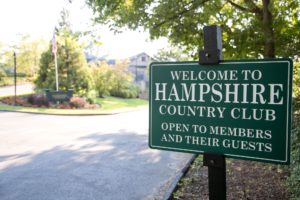Hampshire CC developer claims Mamaroneck Village thwarting project
A developer has sued the Village of Mamaroneck claiming that the planning board is illegally refusing to act on its plans to build housing on the grounds of Hampshire Country Club.
 Hampshire Recreation LLC accuses the planning board of failing to file a final environmental impact statement and then submit its findings within deadlines established by state law.
Hampshire Recreation LLC accuses the planning board of failing to file a final environmental impact statement and then submit its findings within deadlines established by state law.
The village is “continually moving the goal post,” according to a petition filed Nov. 22 asking Westchester Supreme Court to compel Mamaroneck to act.
Mayor Tom Murphy responded in an email, “The lawsuit is the legal posturing of an outside developer more intent on publicity and scare tactics than fully cooperating with the deliberative process.
“Mamaroneck, as a community, is not easily intimidated by legal bullying tactics,” Murphy added. “I fully support the planning board and village staff who have been giving the largest development project in village history the close and careful look it deserves.”
Hampshire Recreation, owner of most of the acreage at the country club, in the Orienta section of the village, submitted an application for the Residences at Hampshire in 2015.
It has proposed building 44 houses and 61 townhouses on 65 acres and setting aside nearly 31 acres as open space for the residents and neighbors. The golf course would be downsized to nine holes, and existing wetlands would be preserved.
The process of satisfying a town”™s zoning, land use and building requirements for a large project, as well as Seqra — the State Environmental Quality Review Act ”“ can be an arduous undertaking.
Hampshire first created a scoping document that identified the significant issues. The planning board declared itself as the lead agency to coordinate the Seqra process and adopted the developer”™s final scope.
Next, Hampshire prepared a draft environmental impact statement, including the measures it would take to mitigate or avoid environmental problems.
Hampshire submitted a 2,491-page report in April 2017. The board rejected it as inadequate, according to the petition, and did not accept the report until December 2017, after four revisions had been submitted.
The planning board held two public hearings last year and accepted written comments up to mid-May.
At that point, Hampshire argues, the board was required to file a final environmental impact statement within 45 days, and then 30 days later issue its findings.
Instead, the board required Hampshire to prepare a proposed final environmental impact statement. Hampshire submitted more than 3,000 pages, including responses to 959 comments, in October 2018.
The planning board required the developer to respond to another 231 comments, the petition states, including comments solicited from opponents long after the official comment period ended.
Hampshire accuses the planning board of encouraging members of the Mamaroneck Coastal Environmental Coalition, “a small but well-funded opposition group comprised of a handful of neighbors living next to the club,” to submit comments.
Hampshire argues that many of those comments were opinions, not facts, and were beyond the scope of the project.
The planning board has held 13 meetings in the past 14 months, according to the petition, but has repeatedly refused to accept any version of Hampshire”™s proposed final environmental impact statement.
“Even the board’s own expert consultant stated at the Sept. 10, 2019 meeting that he believed the board has all the information it needs to finalize and deem the (final report) complete,” the petition states.
On Nov. 13, after more than two hours of conducting other business, Hampshire charges, the planning board refused to discuss the project, “claiming that it had not had enough time to review the document.” The meeting was adjourned to Dec. 3.
“All Hampshire is trying to do is get a decision,” David J. Cooper, the developer’s attorney said in a telephone interview. “This isn’t an issue of bullying or legal posturing. Hampshire has no choice left but to seek the court’s help because the planning department has refused to comply with its duty under Seqra.”
The developer is asking the court to order the planning board to deem the final environmental impact statement complete and to issue its written findings.
Westchester Supreme Court Justice Linda S. Jamieson ordered the village to respond at a hearing on Dec. 20.
Cooper and Matthew J. Acocella of Zarin & Steinmetz, White Plains, represent Hampshire Recreation.